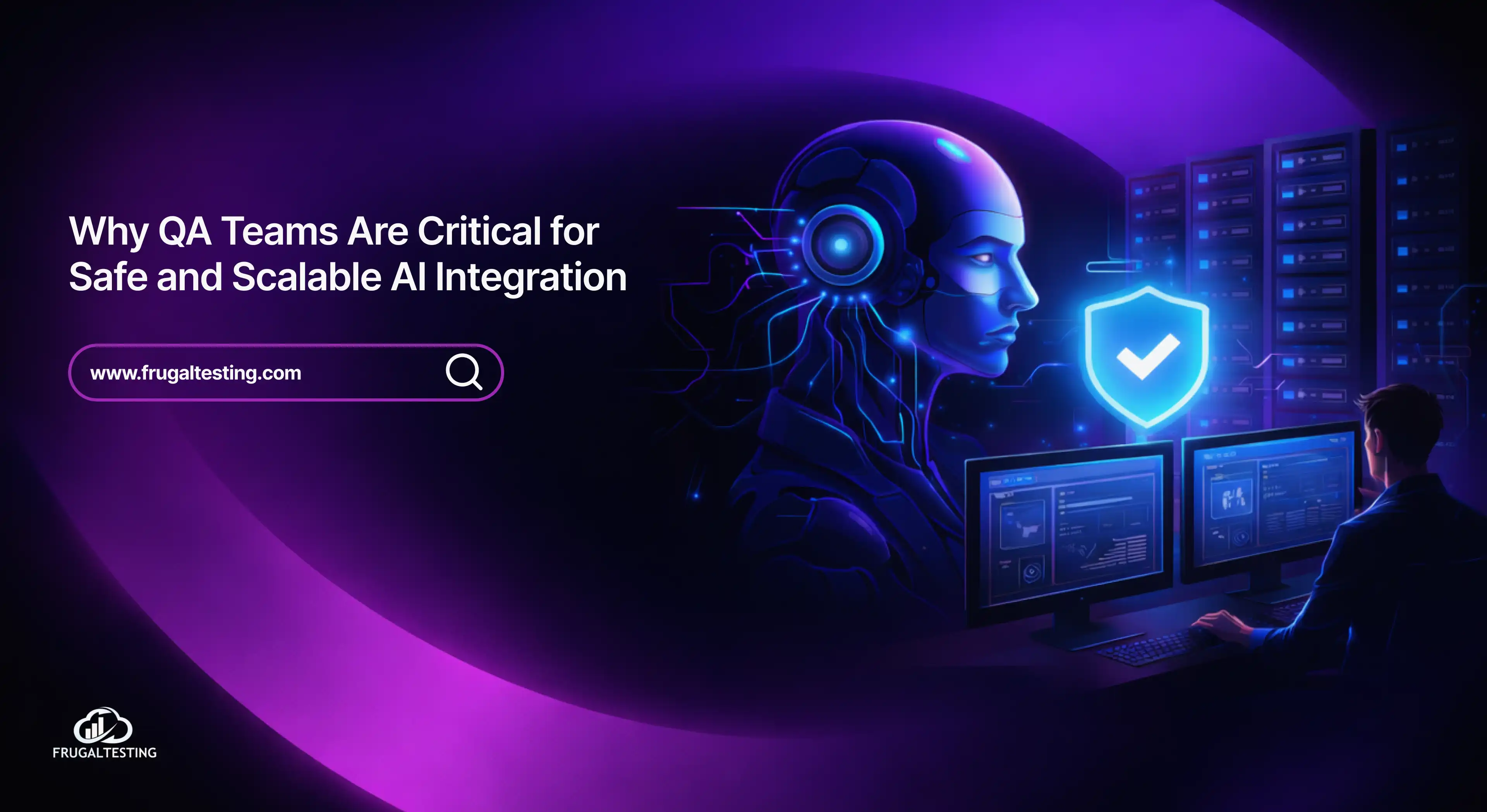Let's discuss how artificial intelligence (AI) is revolutionizing performance testing. We'll learn how artificial intelligence (AI) is changing performance testing and enabling previously unheard-of levels of efficacy and efficiency as we delve deeper into this fascinating subject. Come along as we explore cutting-edge methods and perspectives that maximize application performance and dependability by utilizing AI. This blog will provide you with the expertise to use AI to improve your performance testing tactics, regardless of your experience level in the industry.
Get ahead with these must-know takeaways, and see what you’ll learn! -
📌 How AI is Transforming Software Testing for Performance Enhancement
📌 The Impact of AI on Software Testing: Ushering in a New Era of Automated Performance Evaluation
📌 AI-Powered Testing Tools: Boosting Software Performance via Automation
📌 The Significance of AI in Testing Software Performance for Scalability and Speed
📌 AI-Driven Testing Automation: Simplifying Software Testing for Enhanced Performance
📌 AI Enabled Testing Tools: The Catalyst for Faster Website Performance Testing
AI for Performance Optimization in Software Testing
Artificial Intelligence (AI) is transforming the field of software testing, especially when it comes to improving performance. By incorporating AI into software testing, teams can expand the scope of their tests, minimize the need for manual work, and boost productivity. AI software testing tools handle intricate performance tests, making it faster to pinpoint issues in applications.
![if AI is, say, 10x faster [than humans], that’s 10x more [code], or 100x more code to test. Humans can’t scale, even if we have the ability to type fast. We can’t scale 100x.](https://cdn.prod.website-files.com/64b7ba4dc9375b7b74b2135e/6703d20edad252988c4713c7_6703ce3a39d8af0967fc19b2_1.webp)
These tools employ AI techniques to replicate heavy usage, track how resources are used, and forecast how the system will react under pressure. With AI-supported testing automation, software testers can fine-tune the performance of websites and WiFi, guaranteeing a smooth experience for users. Moreover, AI-driven free tools for website performance testing simplify the process of examining performance data without the expense.
The adoption of AI testing software is crucial for speeding up and improving the efficiency of software performance testing, ensuring it can handle large volumes and operate quickly. This represents a new phase where AI-led performance testing provides quicker and more precise information on software quality assurance.
AI in Software Testing: A New Era of Automated Analysis
Artificial intelligence (AI) is revolutionizing software testing, particularly in the area of performance evaluation. The era of manually reviewing test outcomes and performance indicators is long gone. Now, AI integration in testing makes the entire workflow more intelligent and efficient. AI based testing tools can quickly sift through vast quantities of data, pinpointing performance problems that would take people hours or even days to detect.
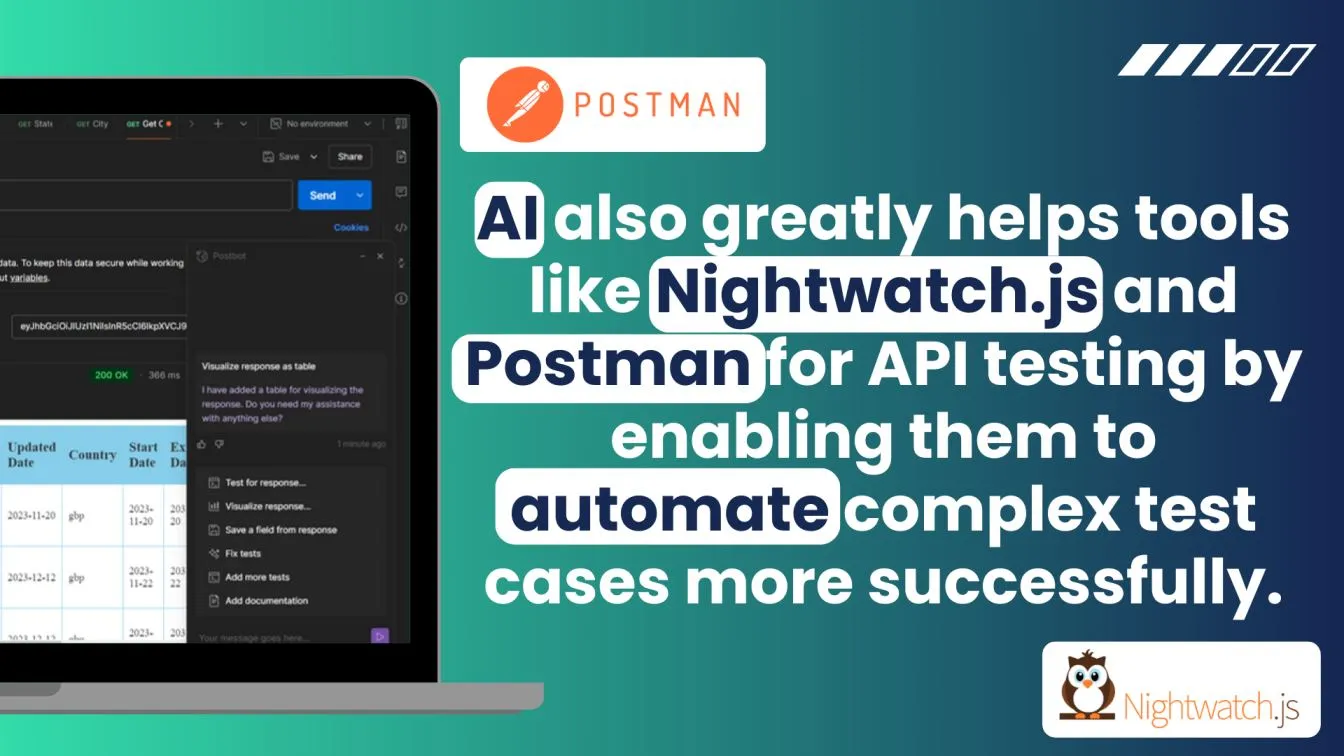
AI-supported testing enhances not just speed but also the ability to forecast how the system will act under different scenarios, guaranteeing that your software operates smoothly even when facing heavy traffic. Whether it's about how websites perform or the testing of WiFi, AI equips testers with immediate understanding, simplifying the process of optimization for improved user experiences.
Furthermore, with an increasing number of AI-centric tools being released at no cost, it's never been simpler to begin. In summary, AI-led performance testing represents a significant advancement, streamlining the process, making it more intelligent, and enhancing its reliability.
AI Testing Tools: Boosting Software Performance with Automation
Artificial Intelligence (AI) is revolutionizing the way software performance is tested by streamlining complex tasks and offering more precise analysis. Here are four leading AI-based tools that are boosting software performance through automation:
Applitools:
Applitools is recognized for its advanced Visual AI testing features, which automate the process of visual regression testing. It locates visual defects in the user interface across various devices and screen sizes, ensuring uniform performance across different platforms.
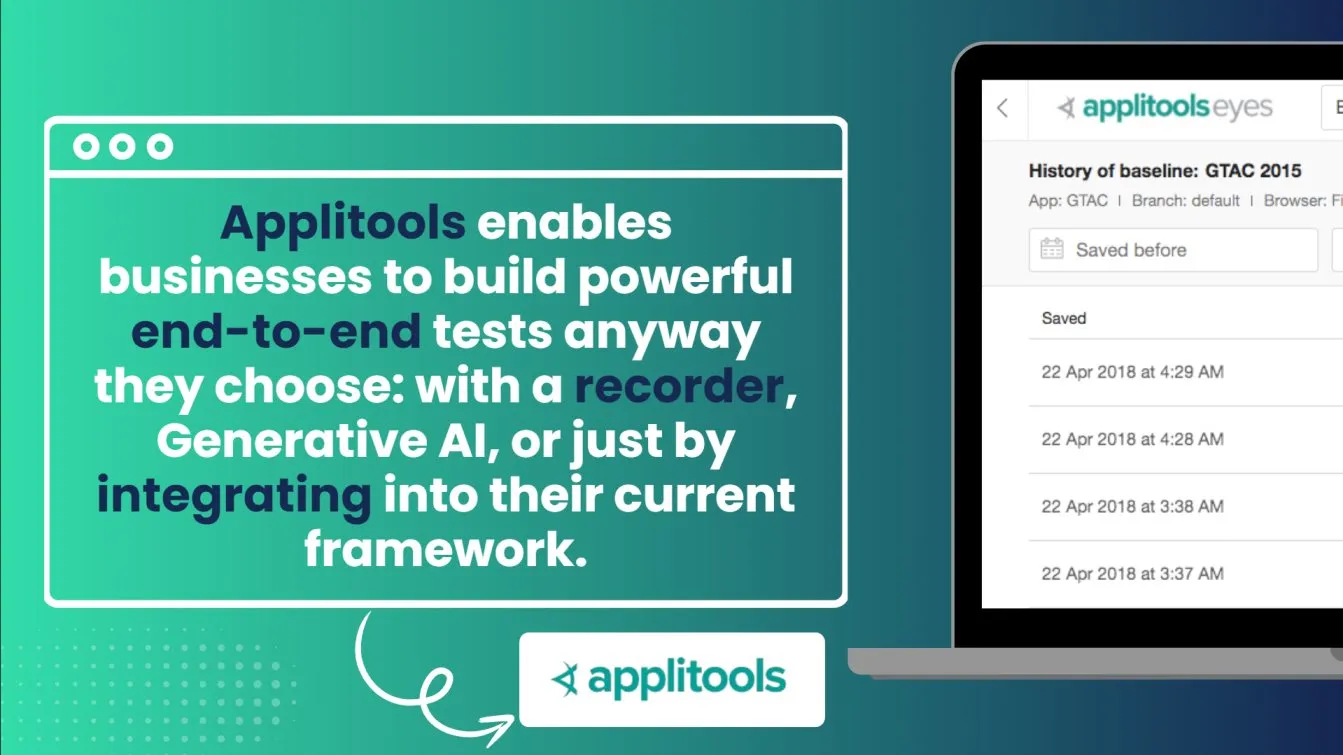
Testim:
Testim employs machine learning to develop and carry out automated tests, minimizing the occurrence of test failures. It learns from previous test executions to enhance its testing methodology, assisting teams in enhancing performance by swiftly pinpointing issues related to software functionality and responsiveness.

Functionize:
Functionize is an AI-powered platform that automates the entire software testing process. It utilizes AI to evaluate performance metrics, mimic user actions, and adjust tests on the fly, guaranteeing that applications perform effectively under a range of conditions.

Mabl:
Mabl combines AI-powered test automation with the monitoring of application performance. It offers insights into how applications are performing by executing automated tests that identify any slowness or failures in real-time, thereby enhancing the software's overall quality and performance.
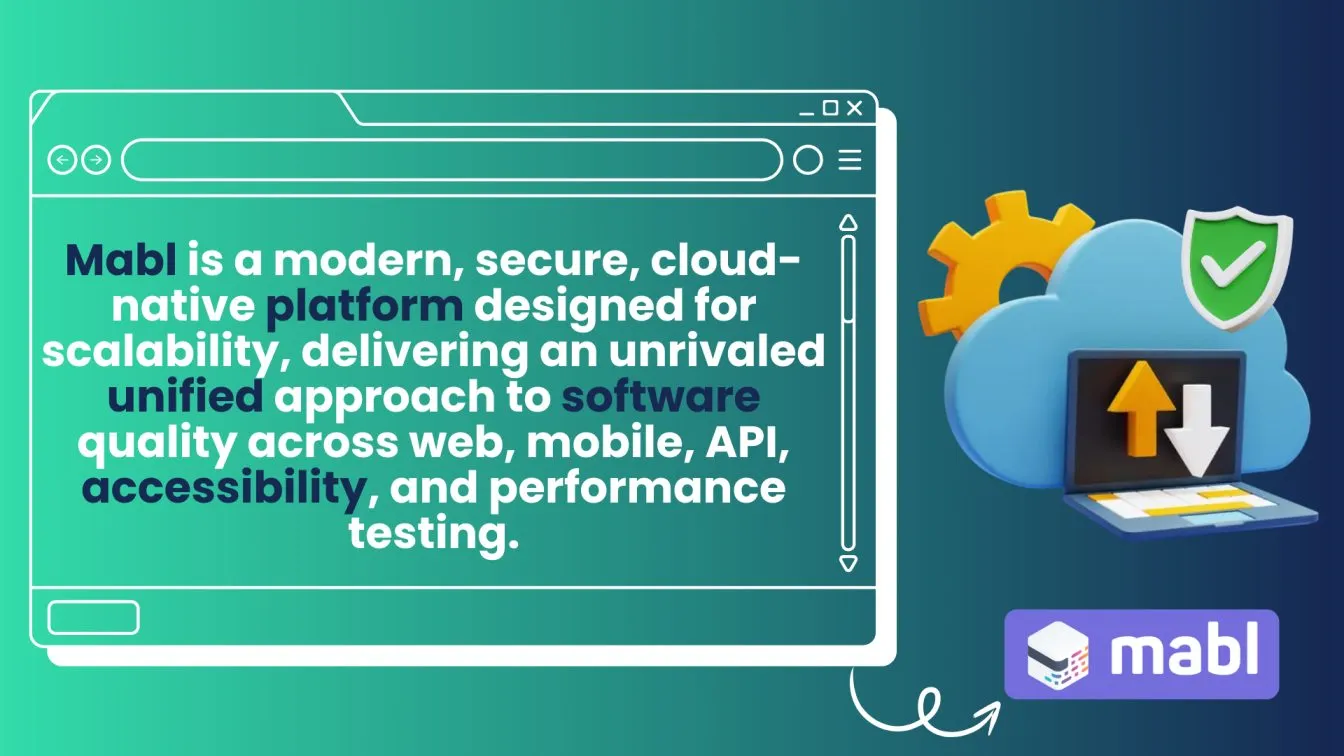
These tools simplify the testing procedure, diminish the need for manual work, and enable teams to deliver high-quality applications more quickly.
The Importance of AI in Testing Software Performance for Scalability and Speed
Integrating artificial intelligence into software testing is crucial for achieving scalability and efficiency. Here's the importance of AI in performance testing:

- Quicker Testing Processes🚀
AI-powered tools streamline the testing procedures, cutting down the time required to pinpoint performance issues.
- Easy Scalability📈
AI can replicate various situations and user interactions, ensuring the software can manage increased traffic without decelerating.
- Immediate Performance Data🔍
AI-supported testing offers instant information on performance indicators, enabling teams to swiftly address possible issues.
- Minimized Manual Work 🤖
AI automates mundane tasks, freeing up testers to concentrate on the more significant elements of software performance.
AI Testing Automation: Streamlining Software for Improved Performance
Automation powered by artificial intelligence is revolutionizing the way software is developed by greatly enhancing the efficiency and precision of performance testing. Conventional testing approaches are often slow and susceptible to mistakes, especially when dealing with complex software systems. AI-based solutions automatically create, carry out, and evaluate test scenarios, making it easier to pinpoint performance limitations swiftly and effectively.
Thanks to AI, testing groups can replicate the actions of thousands of users, predict possible problems, and verify how software performs under different scenarios, all in a matter of seconds compared to the time it would take to do it manually. This leads to quicker product releases and better-quality software, as performance problems are identified early in the development process.

AI-led automation also adapts based on past test results, constantly refining testing approaches and eliminating unnecessary tests, which saves time and resources. The outcome is a more efficient, economical testing method that improves software performance and guarantees a smooth user experience.
How AI testing tools accelerate website performance testing
Incorporating AI into software testing significantly enhances performance analysis and optimization. By leveraging AI, testing processes become more efficient, thorough, and adaptable to real-world conditions. Below are key benefits of using AI in software testing:

- Simulated User Load: AI technology creates thousands of virtual users to evaluate how a website performs in real-life scenarios.
Example: An e-commerce platform uses AI to simulate 10,000 concurrent users browsing and purchasing products. This allows the development team to see how the site performs during peak shopping hours and identify any bottlenecks. - Quick Issue Spotting: AI rapidly detects issues like slow page loading and delays in server responses.
Example: A media streaming service uses AI to monitor page loading times. The AI immediately identifies and flags slow response times when video content takes longer than usual to load, enabling developers to resolve the issue quickly. - Round-the-Clock Performance Tracking: AI constantly monitors the website's performance, enabling adjustments to be made in real-time for better performance.
Example: A financial services website uses AI to monitor server health and transaction speeds 24/7. If performance dips, the system automatically alerts engineers to make necessary adjustments without affecting user experience. - Learning Algorithms: AI systems adjust and enhance their testing methods using past data, improving the effectiveness of future tests.
Example: A travel booking site uses AI to analyze past server outages. By learning from previous tests and user data, AI enhances testing scripts to prevent similar failures in future testing. - Elimination of Repetitive Work: Automation cuts down on the time spent on mundane tasks, making the testing process more efficient.
Example: An AI system automatically executes hundreds of test cases for an online learning platform, allowing the QA team to focus on more complex testing scenarios and reduce manual effort. - Expanded Testing Capabilities: AI simplifies the process of testing on various devices and web browsers, providing a thorough analysis of performance.
Example: A news website uses AI to run automated tests across multiple devices (smartphones, tablets, desktops) and browsers (Chrome, Safari, Firefox). This helps the team ensure consistent performance across all platforms.
How AI-Based Testing Boosts WiFi Performance Ensuring Seamless Connectivity
Artificial Intelligence (AI) is transforming the way WiFi works by enhancing its speed, dependability, and ability to connect. By using sophisticated algorithms and the power of automation, AI solutions can keep an eye on and fine-tune the performance of networks, offering users a smooth experience. Here's a look at how AI is improving WiFi:
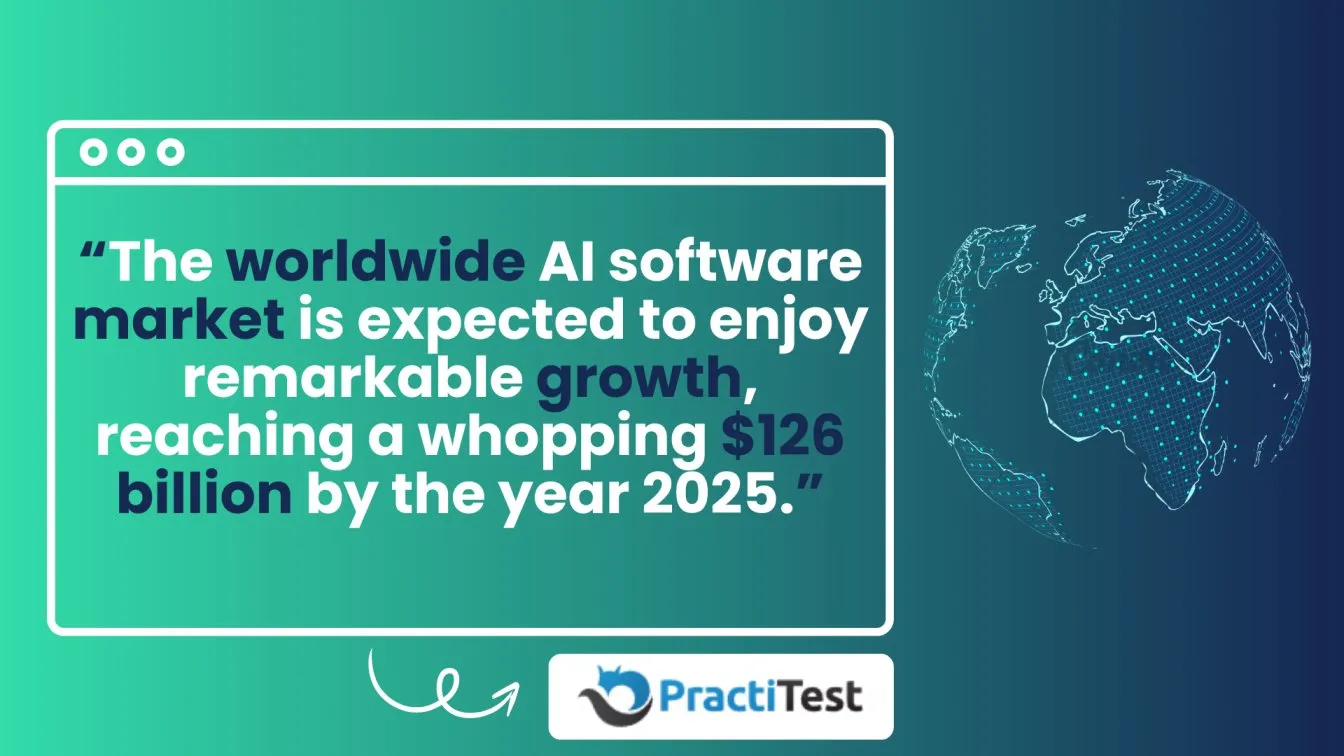
Improved Signal Strength: AI enhances the reach of signals by studying patterns and eliminating weak areas.
Real-Time Network Surveillance: Constant surveillance ensures problems are spotted and fixed right away.
Predictive Network Maintenance: AI forecasts potential problems, stopping them before they happen.
Efficient Bandwidth Distribution: AI manages bandwidth effectively, ensuring consistent performance for all devices.
Swift Issue Fixing: AI quickly locates and solves problems with connectivity.
Better Security: AI spots security flaws, protecting the network against attacks.
Understanding the Role of AI in Testing Website Performance
Artificial Intelligence (AI) is crucial in improving the performance of websites through its introduction of automation, efficiency, and precision. Conventional testing approaches are often lengthy and might overlook minor issues in website performance. AI-driven solutions streamline the testing procedure by mimicking user actions, measuring how quickly the website loads, and pinpointing problems such as delays in server responses, shortages in resources, and more.

A key benefit of AI is its capacity to constantly monitor and assess website performance in real-time, making sure any drop in performance is quickly identified and fixed. AI also adjusts to new situations, drawing insights from past data to enhance future tests. This minimizes the need for manual work, conserves time, and boosts the reliability of the testing method.
AI-powered tools are also capable of expanding testing to various devices and browsers, ensuring a thorough evaluation of website performance. In the end, AI enables companies to improve the user experience by making sure their websites function flawlessly, even when faced with high levels of traffic.
Common Challenges in Performance Testing and How AI Solves Them
Performance evaluation frequently encounters obstacles that can hinder progress and diminish the software's quality. These obstacles, if not managed effectively, result in setbacks and higher expenses. Artificial Intelligence provides robust answers to simplify the procedure, enhancing both speed and precision. Here's how AI addresses typical issues in performance evaluation:
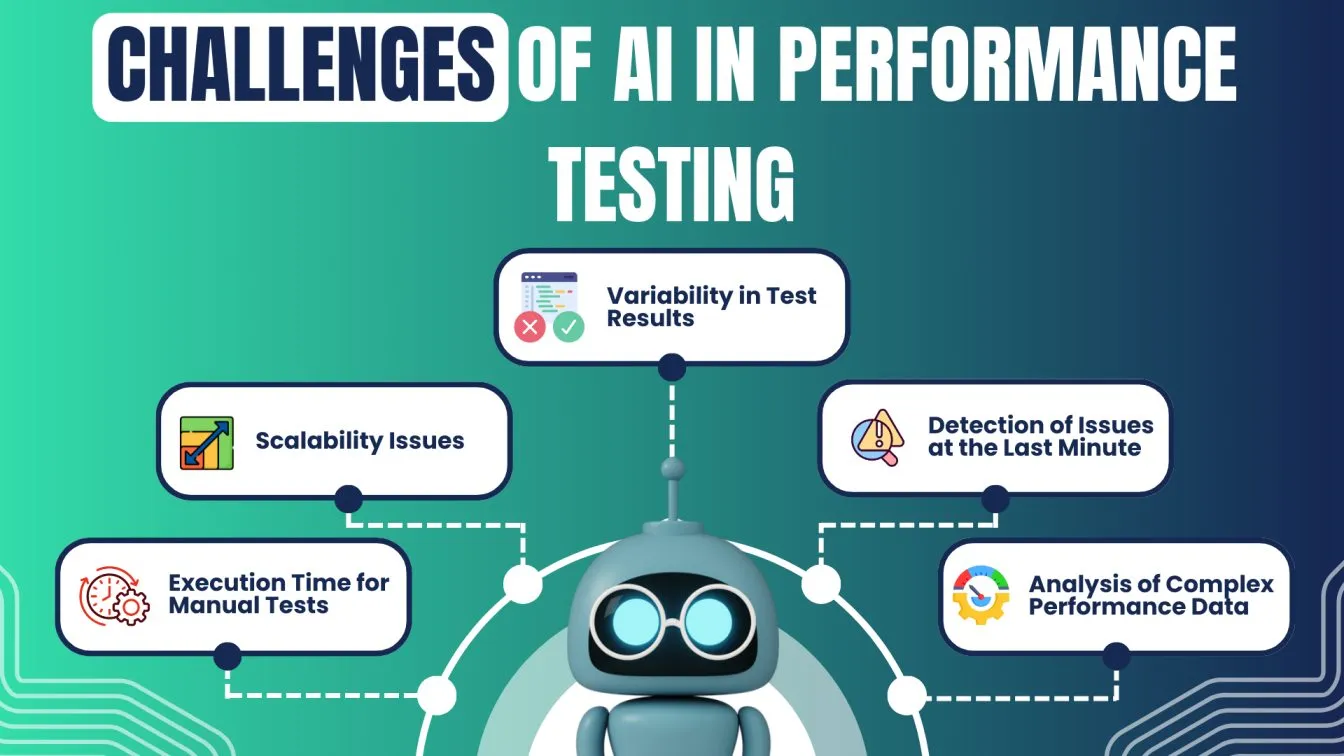
Execution Time for Manual Tests: Standard testing is time-consuming and requires a lot of effort.
AI Solution: AI automates the execution of tests, making the process faster and less demanding.
Scalability Issues: Testing under intense user traffic can be demanding on resources.
AI Solution: AI facilitates easy simulation of heavy loads and scaling across various situations.
Variability in Test Results: Manual testing can lead to inconsistent outcomes.
AI Solution: AI guarantees reliability with uniform automated testing.
Detection of Issues at the Last Minute: Bottlenecks are often identified too late.
AI Solution: AI identifies issues immediately, avoiding problems at a later stage.
Analysis of Complex Performance Data: Analyzing performance data manually is challenging.
AI Solution: AI makes data analysis easier, spotting trends and enhancing performance.
Maximizing ROI with AI-Enhanced Performance Testing Solutions
AI-powered performance testing tools are transforming the way companies increase their return on investment (ROI) in software development. By streamlining the testing process, AI cuts down the time and effort needed to find and fix performance problems, leading to quicker software releases. This faster testing process results in lower expenses and a quicker time to market, providing a significant ROI advantage.
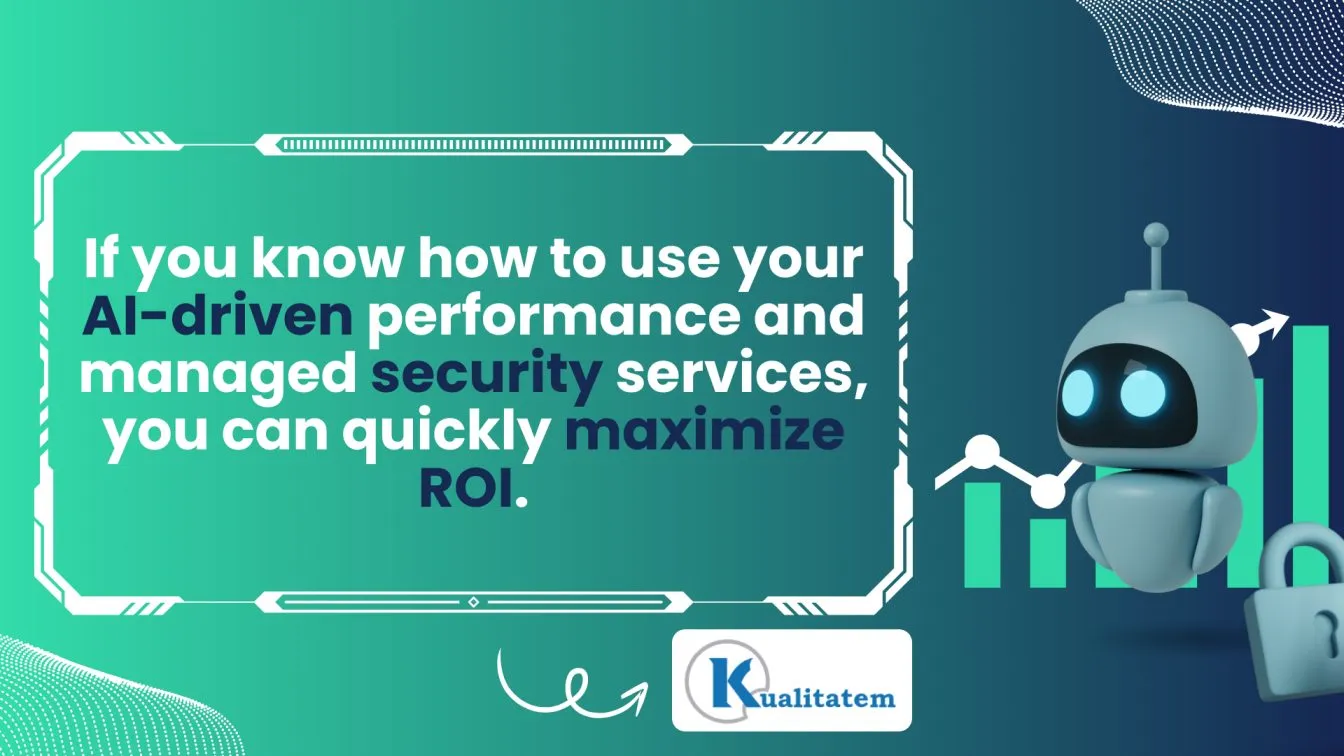
AI-powered instruments can mimic real-life user traffic, swiftly pinpointing performance bottlenecks, slowdowns on servers, and possible failures, enabling teams to fine-tune performance before the software is available to users. The capability to constantly monitor and test performance in real-time allows companies to detect problems early, preventing expensive fixes and interruptions in service.
Additionally, AI-powered solutions offer forward-looking insights, enabling teams to actively enhance software performance, which in turn leads to increased customer satisfaction and loyalty. The blend of automation, adaptability, and forward-looking analytics guarantees that companies not only save time and money but also produce high-quality, dependable software, thereby maximizing their ROI.
Applications of AI in Performance Testing
Artificial Intelligence (AI) is significantly influencing the field of performance testing by streamlining and improving different elements of the procedure. Its practical uses in the real world highlight how it boosts productivity and precision in the testing domain. Here are a few critical uses of AI in performance testing:
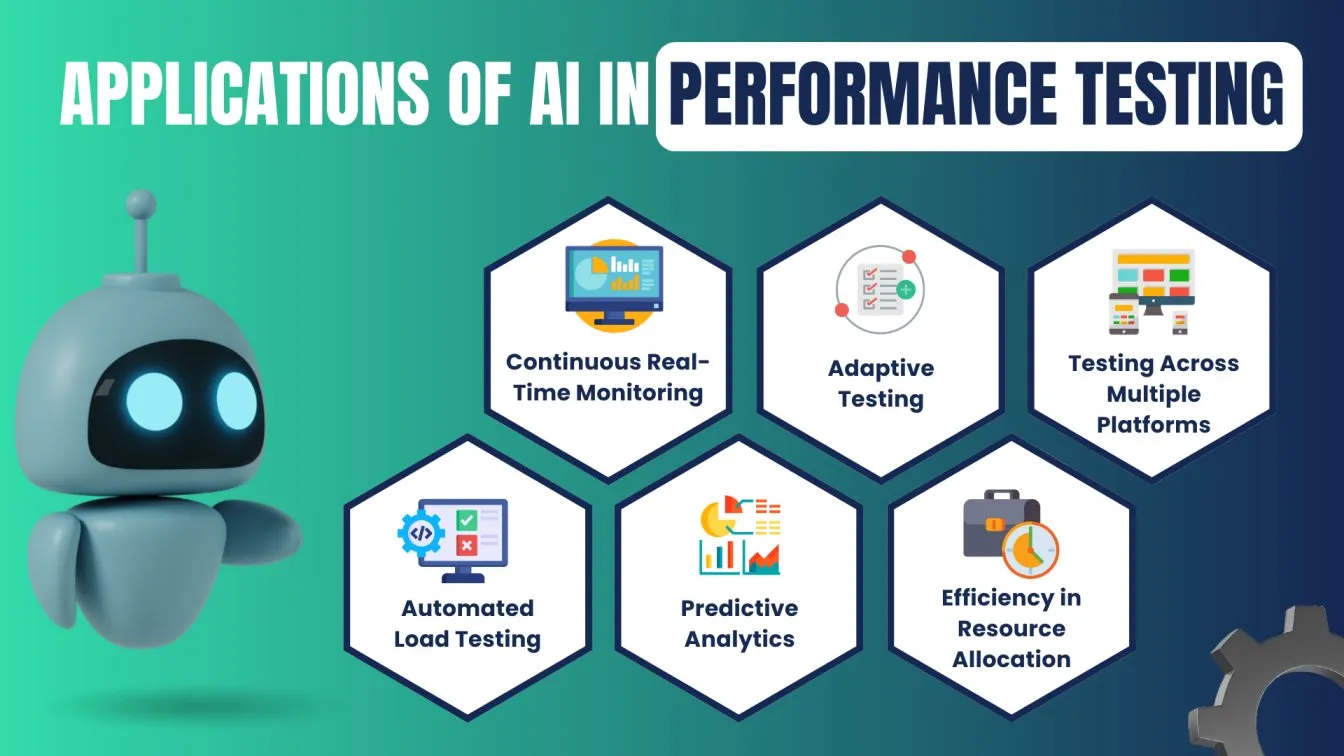
Automated Load Testing 🚀: AI mimics the behavior of thousands of online users, pinpointing and addressing bottlenecks during peak usage.
Continuous Real-Time Monitoring 🔍: AI is always watching over system performance, quickly spotting and fixing problems to ensure uninterrupted workflow.
Predictive Analytics 📊: By examining historical data, AI predicts possible performance problems ahead of time, allowing for preemptive solutions.
Adaptive Testing ⚙️: AI modifies test scenarios based on their outcomes, leading to a more targeted and effective testing approach.
Efficiency in Resource Allocation 💡: AI locates areas where resources are not being used efficiently, leading to better management of memory and CPU.
Testing Across Multiple Platforms🌍: AI verifies system performance on various devices and settings, guaranteeing a consistent experience for users across all platforms.
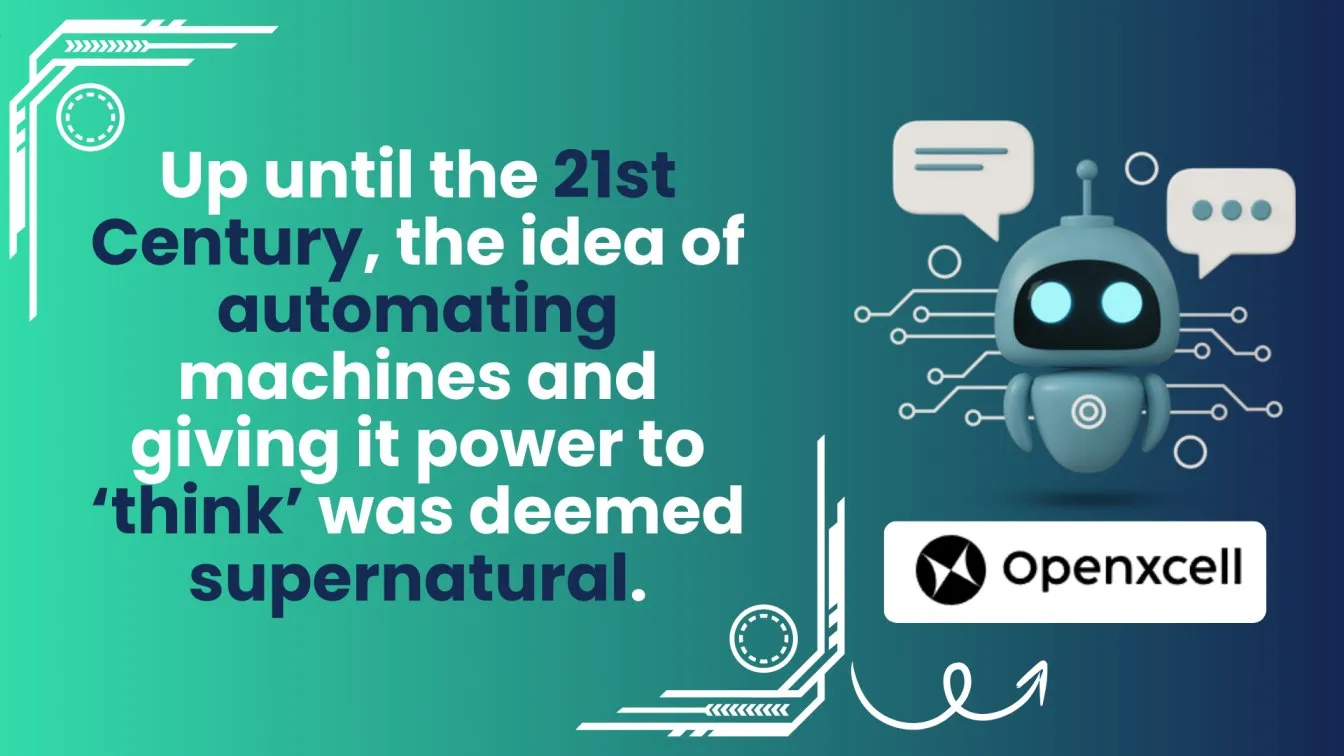
Wrapping up!
In conclusion, AI-driven test automation revolutionizes performance testing by minimizing manual effort, reducing repetitive tasks, and enhancing comprehensive test coverage. Human testers are freed from manual labor, allowing them to focus on strategic tasks that improve efficiency.
Machine learning algorithms and automation tools address potential issues earlier in the software development lifecycle, ensuring better functional and visual testing. Unlike traditional methods, AI-driven tools offer continuous testing across a wide range of user stories and mobile applications, reducing human error and testing time. The proactive approach of AI, combined with self-healing tests and natural language processing, leads to a more streamlined, efficient testing process.
AI-driven test automation is revolutionizing the future of performance testing by significantly enhancing testing efficiency and reducing reliance on traditional methods. Through the use of intelligent algorithms and machine learning models, AI-driven testing tools automate repetitive tasks, allowing human intervention to focus on more strategic aspects of the development cycle. These tools provide comprehensive coverage by generating executable test scripts that ensure thorough testing phases, even for complex applications. Neural networks play a key role in interpreting human language and processing high-quality data, enabling the automation of relevant tests with greater accuracy. This transformation is driving numerous benefits, such as improved efficiency, continuous monitoring, and enhanced test coverage, making AI a powerful tool for ensuring high-quality software.
Moreover, AI-driven test automation is replacing manual methods by offering smarter, more adaptive testing strategies. With comprehensive testing and continuous monitoring, AI can identify areas that need further improvement, ensuring better performance throughout the development cycle. High-quality software can now be delivered faster due to AI’s ability to learn from historical data and adjust testing efforts accordingly. This automation empowers QA teams to focus on refining test strategies while AI handles the routine tasks, driving faster releases and increased efficiency. As AI continues to evolve, it will undoubtedly play a crucial role in shaping the future of performance testing, offering scalability and accuracy like never before.
People Also Ask
👉How is Al used in QA?
Artificial Intelligence is transforming the field of quality assurance by streamlining processes such as security and testing across different web browsers, developing smart automation solutions, and boosting efficiency, guaranteeing a perfect experience for users on a range of platforms.
👉How to measure generative Al performance?
Testing effectiveness, the standard of AI-powered test case generation, and the smooth integration into a testing framework are used to gauge the performance of generative AI.
👉How can Al be used in performance management?
Artificial intelligence boosts the efficiency of managing performance by streamlining tests, boosting compatibility across different web browsers and operating systems, and examining how the system functions. This enables Quality Assurance groups to identify and address performance issues at an early stage, guaranteeing a seamless experience for users.
👉What is performance in Al?
In AI, "performance" refers to the capacity of AI-driven testing instruments to maximize testing effectiveness through the automation of tedious operations, the proactive detection of possible problems, and the generation of thorough test coverage.
👉Will AI replace performance testing?
Performance testing will still be necessary, but AI will supplement it by automating many manual testing tasks. Human testers are still necessary for strategic activities like analyzing results and improving testing frameworks, even if AI-driven testing technologies greatly increase testing productivity and decrease human errors.



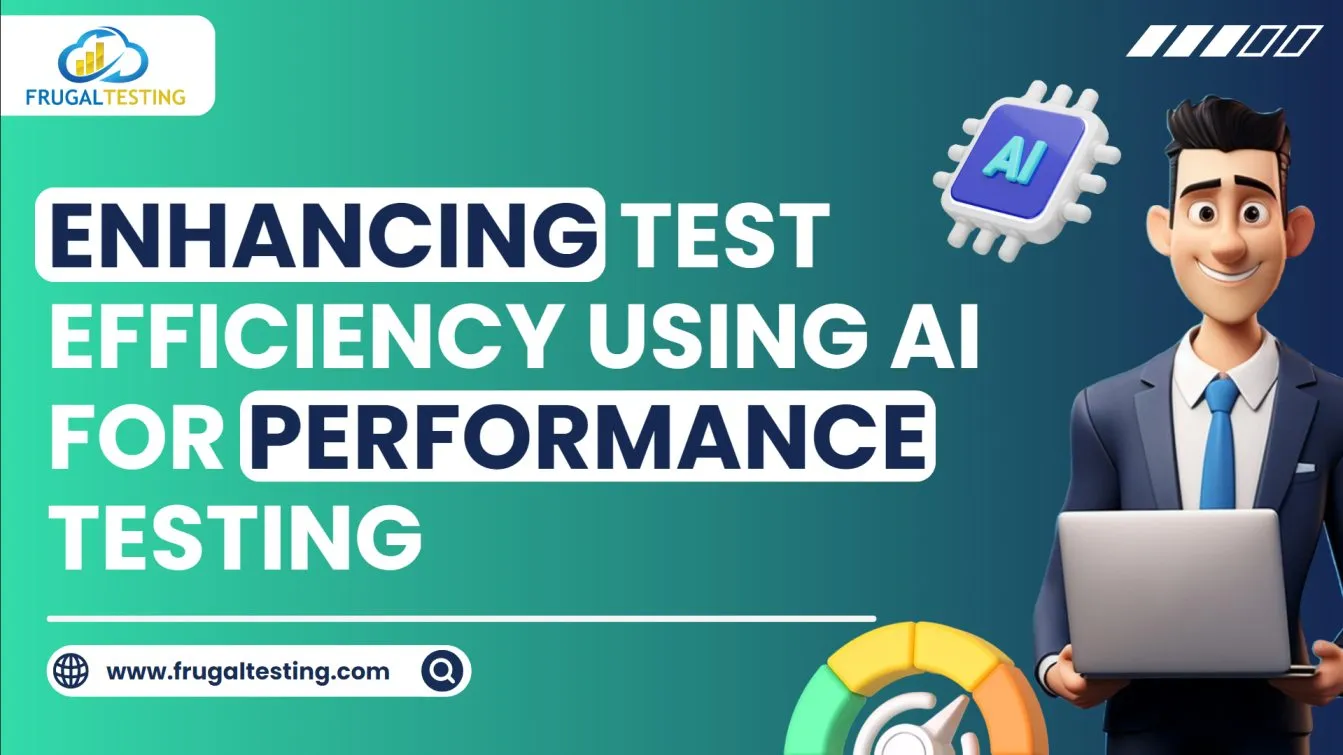
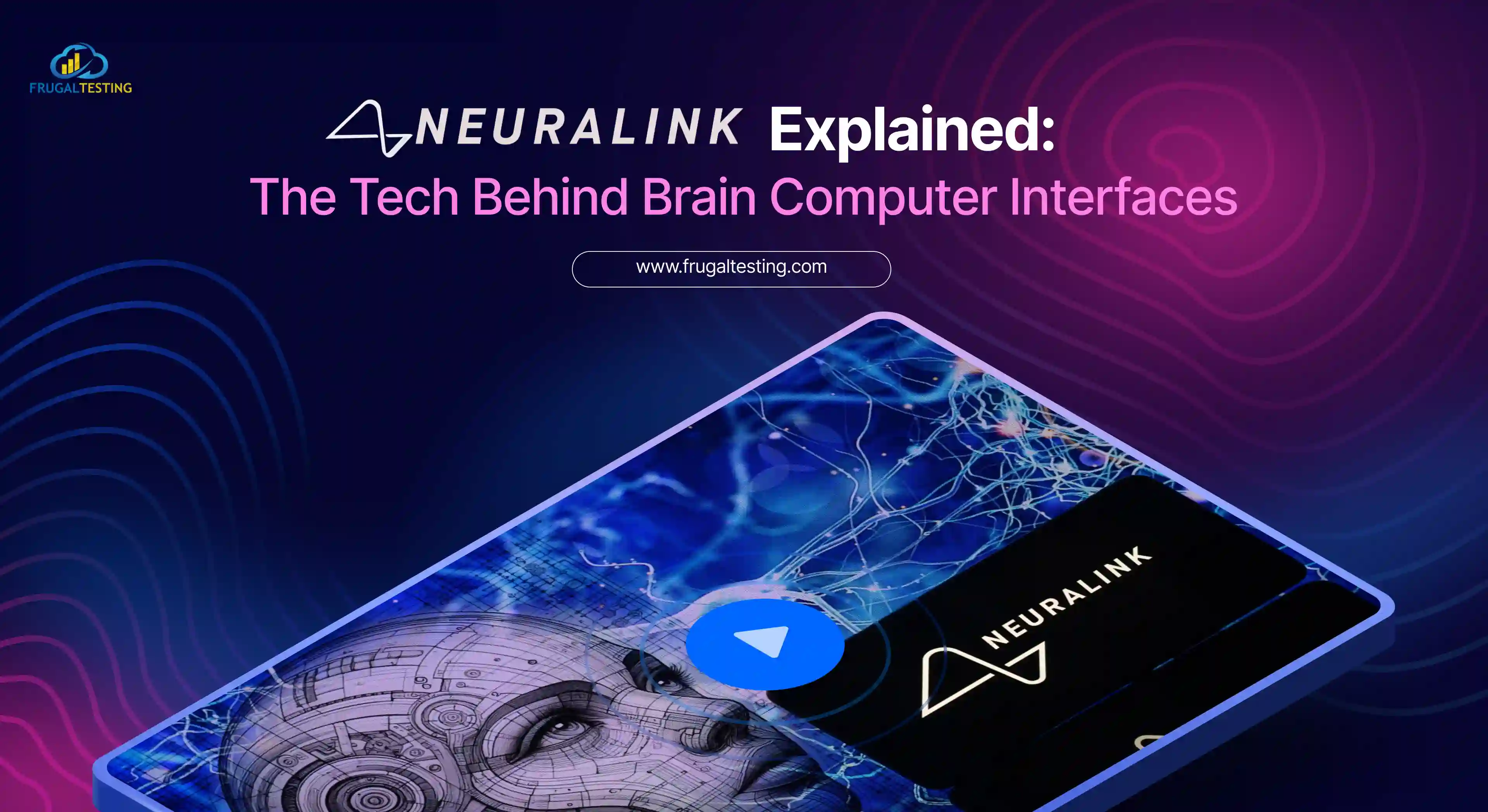
%201.webp)

